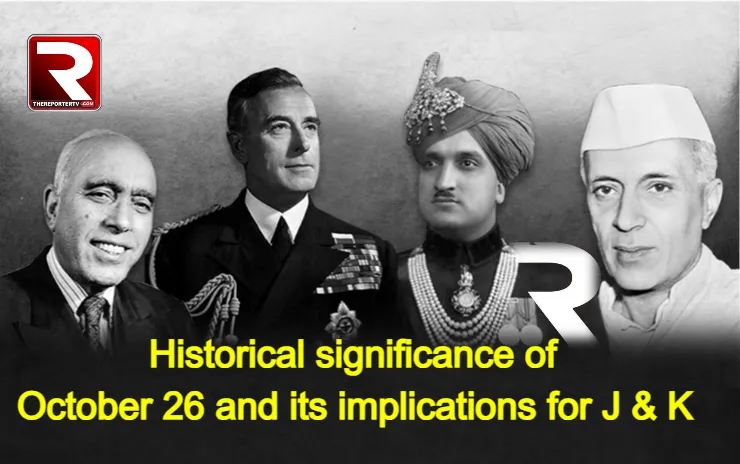On October 26, 1947, the accession of Jammu & Kashmir to India marked a significant turning point in the history of the Indian subcontinent. This pivotal event unfolded when Maharaja Hari Singh, the then ruler of Jammu & Kashmir, formally signed the Instrument of Accession, thereby integrating the princely state into the newly formed Indian Dominion. This decision, viewed as both progressive and strategic, continues to shape the socio-political landscape of Jammu & Kashmir.
Context of Accession
The geopolitical environment at the time of British decolonisation was fraught with uncertainty and conflict, largely fueled by the creation of Pakistan. Following the Partition of India on August 15, 1947, Jammu & Kashmir found itself amidst chaos, facing an illegal tribal invasion backed by Pakistan forces on October 22, 1947. In light of this escalating crisis, Maharaja Hari Singh chose to accede to India, seeking military assistance and support for a peaceful and prosperous future. This decision was not merely a reaction to immediate security threats but also a critical political act that significantly altered the trajectory of the region.
A Strategic Decision
Maharaja Hari Singh’s decision to align with India was a calculated move, aimed at ensuring the growth and stability of Jammu & Kashmir. Faced with external aggression and internal demands for order, he recognized the advantages of joining India, which offered a framework of governance and democratic principles in stark contrast to Pakistan’s military-backed approach. The Maharaja’s foresight is underscored by the understanding that the accession would provide the necessary military and political backing to maintain the integrity of his state.
The Instrument of Accession, signed in accordance with the Government of India Act, 1935, and the Indian Independence Act, 1947, remains a legally valid document under international law. It granted India jurisdiction over Jammu & Kashmir’s defence, communications, and foreign relations while preserving the state’s internal autonomy.
Misrepresentation and International Discourse
Following the accession, Pakistan engaged in persistent efforts to distort the narrative surrounding the United Nations resolutions on Jammu & Kashmir. Central to this contention is the emphasis on the plebiscite clause, which advocates for the people of Jammu & Kashmir to determine their future. However, this interpretation fails to acknowledge the preconditions set by the UN, including the complete withdrawal of Pakistani forces from the territories they occupied during the conflict.
UN Resolution 47, adopted in 1948, called for a ceasefire and urged both parties to withdraw their forces to facilitate a plebiscite, contingent upon Pakistan’s troop withdrawal. Subsequent resolutions also underscored the necessity of demilitarisation as a prerequisite for any plebiscite—conditions that remain unmet to this day.
Despite Pakistan’s continued attempts to challenge the legal framework of the accession, India brought the matter before the United Nations, seeking international mediation to address the conflict. This action was a significant moment in the global discourse surrounding Kashmir, situating the regional dispute within the broader contexts of international law and human rights.
Socio-Economic Progress
Over the years, the decision to accede to India has been reaffirmed by the socio-economic progress witnessed in Jammu & Kashmir. Substantial investments from the Indian government have significantly improved the region’s development trajectory, starkly contrasting with the economic struggles faced by Pakistan. Notably, Jammu & Kashmir’s development budget now surpasses the bailout packages secured by Pakistan from the International Monetary Fund (IMF), illustrating the region’s advancements under Indian governance. This comparative analysis highlights the long-term benefits of the accession, with significant improvements in infrastructure, education, and economic opportunities for the residents of Jammu & Kashmir.
Conclusion
The accession of Jammu & Kashmir to India on October 26, 1947, stands as a landmark event with enduring implications. The Maharaja’s decision to join the Indian Union was legally sound and politically astute, rooted in the necessity for security and long-term stability. Pakistan’s ongoing misrepresentation of UN resolutions and its selective interpretation of historical events do not diminish the legal and historical legitimacy of the accession. The development and progress of Jammu & Kashmir serve as a testament to the correctness of this decision, reinforcing the region’s integration into India and paving the way for a brighter future.


